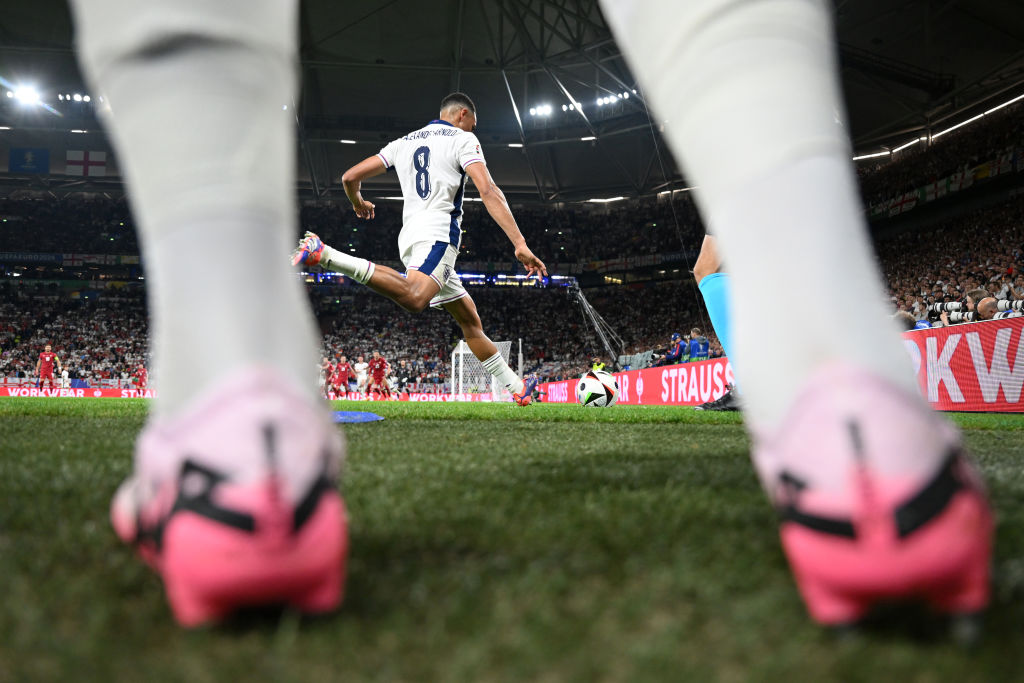
What to do with the England midfield? That has been the main talking point coming into Euro 2024, and looks set to continue for more games to come following Sunday evening’s 1-0 victory over Serba.
Trent Alexander-Arnold received decidedly mixed reviews for his showing against Serbia, which saw him stationed alongside Declan Rice in a double pivot off the ball but given more licence to push forward in possession, with John Stones stepping out of defence into midfield to cover.
That has led some pundits and fans to wonder if Gareth Southgate should consider other England midfield options against Denmark on Thursday teatime. Here’s the pros and cons facing the Three Lions boss.
The case against Trent Alexander-Arnold

The main objection is that central midfield is not simply not Alexander-Arnold’s customary role at club level. Yes, he played there at academy level, but he has been pretty firmly a right-back throughout his senior career at Liverpool since bursting onto the scene in 2016.
Southgate has generally preferred Alexander-Arnold as a midfielder for the past three years, but Jurgen Klopp has only followed suit on a small handful of occasions.
That means that some of Alexander-Arnold’s instincts are not what they should be, as the BBC highlighted in their coverage of the Serbia game after he got caught taking a touch towards his own goal only to cede possession just outside the England box, allowing Aleksandar Mitrovic to take a shot that flew just wide.
A warning from Aleksandar Mitrovic! 😬#BBCEuros #Euro2024 #SRBENG pic.twitter.com/qtknU1mVoSJune 16, 2024
As BBC pundit Cesc Fabregas explained: "At full-back he's normally always got the [touchline] at [his] back, so he never really needs to worry about anything that's happening behind him.”
Alexander-Arnold is quite prone to those kinds of concentration lapses even when playing at full-back, with his attacking talents more than making up for his defensive deficiencies. With other, more established midfield options in the squad, might it behove Southgate to have a look at what someone else can do.
There’s also an argument that TAA’s set piece strengths are less of an important tool with England blessed with several other very capable options, including Kieran Trippier and Phil Foden.
The case for Trent Alexander-Arnold

Even when Alexander-Arnold plays as a full-back, his strengths are all in attack – so why not play him in a position that emphasises that?
He had a mixed performance against Serbia in the side’s Euro 2024 opener, but has shone in midfield for England in the past, earning particular plaudits for his show-running performance against Bosnia and Herzegovina a couple of weeks ago, capped by a lovely goal to boot.
Southgate spoke before the Serbia game of how Alexander-Arnold’s incredible passing range offers England a different dimension, particularly when he gets on the ball in deeper positions.
His comfort getting forward and drifting wider proved to be a useful distraction for England as they scored their opening goal, with Alexander-Arnold’s positioning in the half-space helping to create room for Bukayo Saka to run directly at his left-back and cross for Jude Bellingham to head home.
WHAT A START FOR ENGLAND! 💥Jude Bellingham heads the Three Lions ahead 🔥#BBCEuros #Euro2024 #SRBENG pic.twitter.com/CItON2je22June 16, 2024
Saka continued to enjoy getting the best of that individual battle throughout the rest of the first half, but Serbia found themselves unable to double up on him effectively without risking Alexander-Arnold going completely free.
The Liverpool man was not terribly effective on the ball against Serbia, but was far from alone in that: Phil Foden also offered little, for instance, while Saka was quiet in the second half before being replaced by Jarrod Bowen. So why are we not having the same debate around them?
England’s issue for much of the second half was in getting the ball out of their own third – though admittedly, there’s a strong argument that Alexander-Arnold had a key role to play in that.
Above anything else, though, is the fact that Southgate’s other midfield options to partner Rice are not much more of a sure thing: Conor Gallagher, Adam Wharton and Kobbie Mainoo have fewer caps between them than Alexander-Arnold on his own. Are any of them less of a risk at a major tournament?
We’re not keen on the much-touted idea of moving Bellingham or Foden into that role, either. The Real Madrid youngster showed against Serbia how valuable he is in an out-and-out number 10 role, while Foden’s skill set is also much better used higher up the pitch.
So should Trent Alexander-Arnold be dropped?
We’re honestly a bit torn, but with three points already assured, our overall feeling is that he should be given another chance to make an impression against Denmark, especially as Southgate’s planning for the tournament was presumably put together with Alexander-Arnold in mind.
We agreed with Fabregas’ further assessment of Alexander-Arnold: “Obviously now he needs to adapt to this new position, but he's got the natural ability and the capacity to do it.”
If he does hit his stride, England will have yet another attacking weapon at their disposal who is capable of coming up with real magic on his day.
And if he doesn’t, then he can be replaced from the bench again against Denmark, with the Slovenia game providing an opportunity for Southgate to take a look at somebody else from the start before the knockout stages get underway.
More England stories
Jude Bellingham's strange England goal celebration with Trent Alexander-Arnold explained
What England need to qualify for knockout stages after beating Serbia
'Top centre-half' Marc Guehi earns rave reviews after England tournament debut







